Avon Van Hassel's Blog, page 3
February 4, 2023
The Time Machine: The Relationship Between Nathaniel Hawthorne and Herman Melville
Back in 2021, I made a video on YouTube about Napoleon’s letters to Josephine, and it is far and away the most viewed video on my channel. It was so popular, it made me want to make a tradition of reading overblown and cringey letters from famous people. You can watch the original video here:
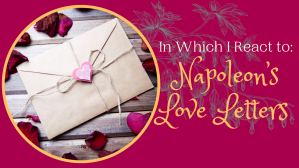 Brace yourself, it’s a lot
Brace yourself, it’s a lot~This post contains an affiliate link. If you’re interested in this book, please consider purchasing through the link provided. It gives me a little bit of Jeff Bezo’s filthy, filthy lucre because writing full time is expensive, and he doesn’t need the money for more joyrides in space. :-)~
Making the rounds lately has been an interesting post, regarding the nature of the relationship between two of literature’s heavyweights, Nathaniel Hawthorne and Herman Melville. When I first heard about it, it felt like a real life fandom crossover. Like, how would these two ever cross paths? I honestly didn’t realise that they were contemporaries. And it turns out that they were equally as surprised-and pleased- to have found each other. So, let’s have a look at one of American literature’s great friendships, possibly even great romances.
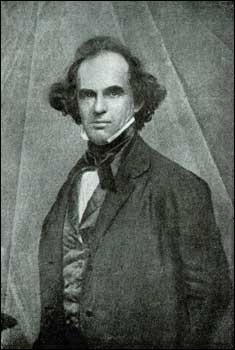 Nathaniel Hawthorne
Nathaniel HawthorneYou know Nathaniel Hawthorne as the author of The Scarlet Letter, The House of Seven Gables, and Mosses from an Old Manse (if you don’t know the last one, it’s ok, we’re gonna talk about it). He also had a collection of shorts called, Twice Told Tales, which annoys me because that’s what I wanted to call my publishing house, and he beat me to it by like 150 years. I mean, it is a Shakespeare reference, so hardly original to either of us, but still. (We’re gonna talk about Shakespeare, too.)
Hathorne [sic] was born in 1804 in Salem, Massachusetts, to a family prominent in US history. Most notably of these was his great-great-grandfather, John Hathorne, who was a judge during the Salem Witch Trials. This Puritan heritage informed much of his writing, especially evident in his most famous works. Indeed, he added the w sometime in his early 20’s, probably to distance himself from the family reputation.
When he was 12, his family boarded with some farmers in Maine, and when he was 16, he hand wrote and published a little newsletter, which he delivered to family members. At 17, he attended Bowdoin College, where he met future president Franklin Pearce and my personal favourite poet, Henry Wadsworth Longfellow. He described himself as an idle student, preferring to study his own interests than the curriculum.
In 1828, he started self-publishing his early work, which didn’t sell well. That’s fine, though. We love a self-published king. He also served as editor of the American Magazine of Entertaining and Useful Knowledge, which is an objectively awesome title. He also accepted a job as a weigher and gauger in the Boston Custom House and roomed with some movers and shakers, like poets, congressmen, and naval officers. What a time to be alive.
In 1841, he joined a Utopian society so he could marry Sophia Peabody, a transcendentalist illustrator. The couple married in 1842 and moved into Old Manse, a historical house, where one of their neighbours was Ralph Waldo Emerson. The two were deeply in love and compatible and had three children, Una, Julian, and Rose, very quickly together.
Mosses from an Old Manse is a collection of 23 previously-published short stories that Hawthorne compiled and named in honour of this house. Many of these stories were already known, so it enjoyed some commercial success. He sent a copy to Poe because he literally lived my dream, and Poe was like, ‘the guy is a genius writer, but his friends suck,’ and then Emerson wrote his own review, declaring that Hawthorne was underpaid. Looks like he was paid $75 in 1846, which would have been $2,902.69, by 2022 money. So, yeah, that’s not much. But the real meat about this book is Melville’s response.
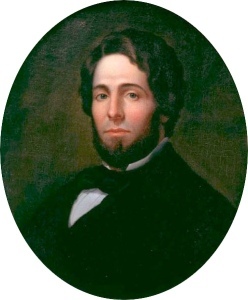 Herman Melville
Herman MelvilleYou recognise Herman Melville as the author of Moby-Dick (yes, hyphenated), ‘Bartleby the Scrivener,’ and ‘Benito Cereno.’ I recently read the last one, and if you haven’t, holy shit, you should. It’s good, y’all. Like, genuinely genius (though, content warning for fairly racist language, because it was 1855).
Melville was born in 1819 in New York City, to an equally prestigious family. Both of his grandfathers, Major Thomas Melvill and General Peter Gansevoort, fought during the Revolution, with Melvill participating in the Boston Tea Party, and Gansevoort defending Fort Stanwix in 1777.
A mediocre student, though a good writer from an early age, Melville dropped out early, most due to his father’s poor money management. He went through a series of jobs, including as a bank clerk, working at his father’s fur store, and as a teacher, all the while trying to continue his studies, where he could. Eventually, the need for more gainful employment led him to the sea.
In 1839, he got a job on a merchant vessel, St Lawrence, from New York to Liverpool. He briefly returned to teaching, but didn’t get paid, so he joined on with the whaling ship, Acushnet. Much of his work concerning sailing was inspired by this job. In 1842, he and another crew mate jumped ship, participated in a mutiny, was jailed, and broke out. In August of 1843, he joined the US Navy, and was discharged in October.
So, from all of this, he developed a mistrust of authority, a drive for freedom, and a deep self confidence, with the feeling that life and the universe had imposed unnecessary hardships on him, which held him back from achieving his full potential.
In 1845, he began writing, starting with Typee, which was inspired by that time he and a buddy jumped ship in Nuku Hiva. Notably, this book drew the attention of one Nathaniel Hawthorne, who heaped upon it glowing praise.
In 1847, Melville married Elizabeth Knapp Shaw, who he had only known a few months, and in 1849, their first child, Malcolm, was born.
Their friendshipIn August of 1850, the two crossed paths at a picnic in Pittsfield, Massachusetts. While other famous people were also in attendance, Hawthorne and Melville found themselves caught in the rain, took shelter together, and had a deep and personal conversation.
Melville had been given a copy of Mosses from an Old Manse, though he hadn’t read it. But after meeting Hawthorne, he read the book and published an anonymous review, titled, ‘Hawthorne and His Mosses,’ where he heaped purple praise on his new friend. Hawthorne did write a review of Typee, but I can’t find a date for that, so I don’t know if he wrote it before or after they met.
About Mosses, Melville revels in Hawthorne’s ‘blackness,’ or seldom-seen dark side, which ‘so fixes and fascinates’ him. He also openly compares him to Shakespeare, while offering very vague and surface level criticism of the actual pieces. It very much reads like doing your buddy a solid and leaving a 5-star review because you love them SO FUCKING MUCH. (Btw, if any of you feel compelled to do that for me, I will absolutely write you a sickly-sweet love letter)
About Typee, Hawthorne praised the youth and vigour of the writing, as well as the sumptuous setting details, and the delicacy with which Melville handles cultural portrayals. Hawthorne himself recognises that American and European society wasn’t ready for the way that Melville dealt with the people of Nuku Hiva, and lifted him up for it. It also very much reads as ‘my buddy is so cool and smart, you gotta read this book!’
Their personal correspondence was constant and fervent, and they visited each other often, with and without their families, and often without warning. From their first meeting in 1850 to their last in 1864, they each would have a huge impact on the other. During these years, they both published their biggest works. Indeed, Moby-Dick is dedicated to Nathaniel Hawthorne, and many have speculated that in addition to being inspired by real life events, the white whale himself represents Melville’s obsession with Hawthorne.
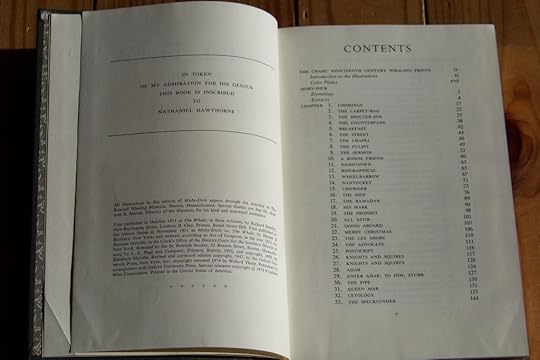
It’s not hard to imagine what the two saw in each other. Hawthorne was fifteen years older, plagued by a family curse and surrounded by artistic and political luminaries. Possessing a sensitive and poetic nature, and described by Melville as being beautiful almost beyond belief, he was a true tragic romantic hero in the style that any Bronte would approve. Melville, by contrast, had lived a life of adventure. The grandson of two heroes of the Revolution, he had lived a life on the sea, from which he developed a dashing, adventurous nature. Yet, he was also an accomplished poet, who, like Hawthorne, had eschewed the structure of a formal education in favour of artistic freedom. Both men were progressive, in their own way, for the time. The Scarlet Letter is lauded as a proto-feminist novel, and Typee seemed to be an early attempt at anthropology.
Other keyboards will speculate on the exact nature of their relationship, whether it was romantic and sexual, or simply a deep and profound platonic friendship. I personally cannot say, and it feels inappropriate for me to do so. They certainly lavished affection on each other, but as we only have letters for evidence, and people did write like that in the 1800s, it doesn’t feel like strong enough proof for me. Whatever the relationship, it was strong and beautiful, and they made no attempt to hide it, and I love that for them.
But I promised you letters, so here are a few. Unfortunately, I can only find Melville’s letters to Hawthorne, and none from Hawthorne, from a book called, Divine Magnet, compiled by Mark Niemeyer. However, I have to assume they were equally rapturous, given that Hawthorne is the one who held onto his. Read them to whoever you love.
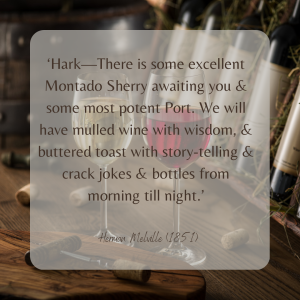
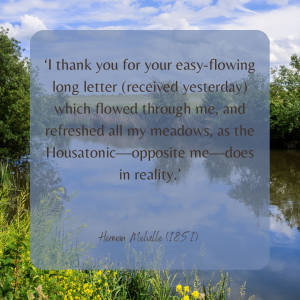

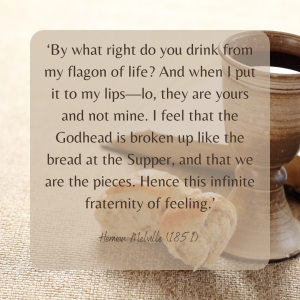
If you want to hear me read even more, check out my new video, below:

Please, if you know of any more real-life OTPs, or any cringy historical love letters, feel free to send them my way! I’d love to get a series going.
January 7, 2023
The Reading Nook: 2023 Reading List
Last year’s list was ambitious. In my defense, I read A LOT of books, just like, only one of them was on the actual list. So, I will post a list that needs to be reviewed, books currently in progress, and the ones I have stacked up and waiting.
Finished in 2022 that need to be reviewed Finale, by Stephanie GarberOur Crooked Hearts, by Melissa AlbertThe Crimson Thread, by Kate ForsythNorthanger Abbey, by Jane Austen (unabridged, and the audiodrama)Once Upon a Broken Heart, by Stephanie GarberLegendborn, by Tracy DeonnRamona, by Helen Hunt Jackson Josefina series, by Valerie TrippIn progress (I DO NOT LIKE reading more than one at a time, but 2022, amirite)Tower of Ravens, by Kate ForsythThe Silmarilion, by JRR TolkienA Feast for Crows, by George RR MartinBloodmarked, by Tracy DeonnThe Mysteries of Udolpho, by Ann Ward RadcliffeRogue Wave, by Jennifer DonnellyTo read in 2023Dark Tide, by Jennifer DonnellySea Spell, by Jennifer DonnellyWitches, by Brenda LozanoThe Book of Gothel, by Mary McMyneThe Mermaid of Black Conch, by Monique RoffeyAs with last year’s list, this is mostly to keep myself honest. But you’re welcome to keep up with me. What are your reading goals for 2023?
January 1, 2023
One Word: Progress
2022 sure was a year, wasn’t it?
I don’t know if it was for you, but it sure was for me. It started off strong, and I even had some personal breakthroughs. My social life was top notch, my hair and skin really came through for me, I made some money on the side, and I even traveled abroad! Twice!
I know!
It was really my year, right? Well, no. Most if that time was spent in a pretty deep, dark hole. Shortly after I posted my One Word, I lost my grandmother, with whom I was very close. The night she passed, we watch Encanto, and I listened to, ‘Surface Pressure’ on a loop for months. It felt like every time I got my feet under me, I got knocked down, and it all snowballed. I buried myself in my second job because I just didn’t have the spoons to be creative. I couldn’t even keep up on my blog posting schedule, which is just one a month. However, I did do a hell of a lot of reading, more than any year since I was in college. That couldn’t be escapism, could it?
But even when I’m knocked down, I don’t stay down for long. So, here we are. Another year, another One Word post lowering the bar of expectations.
I don’t want to go into the history, YET AGAIN, so if you want to see where it all began, start here. This year, my word is, ‘Progress.’ Like last year, I’m embracing the notion of ‘any progress is good progress,’ and, ‘progress over perfection.’ I know it sounds like a cop-out, but it really isn’t. I am optimistic, for a number of reasons I don’t want to go into just yet, and risk jinxing it. Just watch this space, ok?
If 2022 was great for you- if you finally got out of your cave, if you felt the sun on your face, if you finally, finally rejoined the world, rested and refreshed, and ready to take everything on, I am so happy for you. You’re a survivor, and you earned the right to rock that.
But if you poked your head outside, got jumped and mugged and left for dead, then I am also proud of you. You survived. Even if you’re still struggling to pick yourself up and dust yourself off, you’re alive and fighting. So, take it easy, be gentle with yourself. You’re doing your best. Keep putting one foot in front of the other, no matter how long it takes.
Any progress is good progress.
Progress over perfection.
How was your 2022, and what is the word you’re taking with you into 2023?
September 21, 2022
Pumpkin spice Outline Draft pics links edit
May 10, 2022
Senses Outline Draft pics links edit
Intro. Inject emotion and anchor in scene
Sight
Literally, what does your character see? This is by far the easiest sense to write. What does the space look like? How are the characters dressed? What are they doing?
But there’s so much more you can add here to really suck the reader in. What do your characters focus on? If you have multiple points of view, this can help establish details about their personalities. For instance, Sulat is terrible at reading faces. She sees the expressions, but she doesn’t always know what they mean. So she looks at hands and feet. A balled fist or tapping toe can tell her much more about a person’s feelings than a scowl or smile.
Alois, on the other hand, is great with faces, to the exclusion of almost everything else. He has good emotional intelligence and is usually able to charm people, but if there’s something happening in the periphery, he has no idea. The two of them work well as a team, with Alois dealing directly with people and Sulat keeping track of their surroundings.
But you can use visual cues more subtly, too. Symbols, colours, and imagery can clue the audience into what’s going on, even if it escapes the characters’ conscious knowledge.
Sound
Sound usually comes to us through dialogue, though large and conspicuous noises are popular, too. But its not just what a character says or that someone is playing piano that will bring a scene to life. How the characters are speaking or playing- the tone and the quality of the sound alters how it is perceived. A sharp tone or jangled melody sits different with the reader than a purr or lilting tune.
Then, to add depth, you might consider background noise, such as chatter of other patrons, the clink of metal utensils on china dishes, or the rumble of traffic outside. Be care, though. Only add it in the natural spaces between action beats. Too much can be distracting.
Smell
They say smell is the sense most attached to memory, so this one, when used correctly, can be powerful. And it is one of the trickier senses to slip in casually. Unless your characters are in a pungent place or dealing with something with a strong odour, you’re almost always going to be using it for triggering memories.
Smell is also one of those tools that can really define a writer’s style. Are you the sort of storyteller who likes to get really down deep in the grime and grit of real life? Or do you prefer give your readers just enough to get the idea without weighing down the vibe?
Touch
Touch is another tricky one, but it can also be used effectively. I like to classify sensory details and internal sensations differently here. Sensory details for touch include things like the texture of fabric, the coolness of the breeze, or pain in a broken leg. Internal sensations are like the fluttering of the gut when one thinks of the object of their affection, the tingling of the spine in a tense situation, or the hollo coldness after a loss. These things can be felt physically, but in a way much more related to emotion than the environment
Again, how a character uses the touch sense can say a lot about them. When Sulat feels a panic attack coming, she pinches the fabric if her pants between her fingers or reaches for the tooling on her leather boots. She also is not the chattiest character, so she experiences a lot of her emotions nonverbally, whereas Alois expresses them out loud.
Taste
Taste for me, is the hardest to incorporate naturally, but it can be done. Taste is connected to smell, so it can also be used to trigger a memory. Perhaps your character still has the remnants of food in their mouths, it could remind them of something that happened at dinner. It can also act like an internal sensations like touch. A bitter or metallic tang can alert the character to a spike in adrenaline, or indicate that they are bleeding after a fight.
April 8, 2022
The Storybook: Goldilocks and the Three Bears
Once upon a time, there were three bears- a papa bear, a mama bear, and a baby bear- who all lived in a cottage in the woods. One day, they made porridge for breakfast, but it was too hot to eat, so they decided to go for a walk in the woods while it cooled down.
Meanwhile, in the village, a pretty little girl with shiny blonde curls was acting far too naughty for her poor mother, so she was cast out of the house. With nowhere else to go, she set off into the woods, where she stumbled upon the Bears’ home.
‘What a charming cottage,’ she thought to herself, and let herself in.
The table was set for three with a big chair, a medium sized chair, and a small chair, each with a bowl of porridge.
First, she sat in the big chair.
‘This chair is too wide,’ she said, and wriggled out to try the next one.
‘This chair is too high.’ She hopped down and settled into the smallest.
‘This chair is just right.’
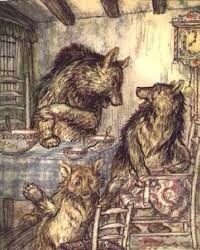
Comfortable, she turned her attention to the porridge, since she hadn’t eaten since her mother threw her out, and all that walking in the woods worked up an appetite.
She pulled all the bowls toward her and tasted from the big bowl first.
‘This porridge is too hot.’ She opened her mouth wide and fanned herself. Then she took a bit from the medium bowl.
‘This porridge is too cold,’ she said with a shiver. She paused before trying the third.
‘But this porridge is just right!’ Delighted, she finished the whole thing.
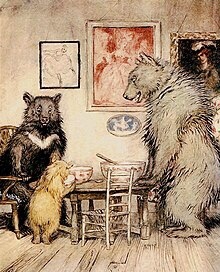
After she had filled her belly with delicious warm porridge, sleepiness overtook her. As she hopped out of the chair, one of the legs broke, but she shrugged and wandered into the next room to lie down. There, she found three beds. She climbed into the big bed and winced.
‘This bed is too hard.’
She moved onto the next and sank nearly to the floor.
‘This bed is too soft.’
But when she climbed into the smallest bed, she barely had time to think before her eyes drifted closed.
‘This bed is juuuust…’
In the forest, the bears collected berries and roots for their porridge, and when they filled their big paws, decided they’d been gone long enough and that it must be cool enough by now.
But when they returned home, they found the door open.
‘Someone’s been in the house,’ Papa Bear said, his ears picking up.
‘Someone sat in my chair!’ Baby Bear cried, pointing at the broken leg. ‘And someone ate my porridge!’
Alarmed, they all dashed into the bedroom.
‘And she’s sleeping in my bed!’
At the commotion, Goldilocks woke with a start, screamed at the bears in the room, and leapt out of the window. She ran all the way home to her mother and vowed to be a good little girl forevermore.

~~~~
The earliest version of the story by Robert Southey, originally had a rude and disgraceful old woman breaking into the bears’ house. I should note that Southey’s tale is the earliest recorded, but an oral version or something similar may be much older.
Later, Joseph Cundall changed the old woman into a young girl, Silver-Hair, and the popularity skyrocketed. Turns out kids connected better with a child protagonist than an elderly one. (Representation, right? Who knew?)
My own version of the story came to me as I was writing the ending of Golden. I knew with Alois living a double life, he’d want some sort of bolt hole to run to, if he ever needed to get Johanne and Rosabel to safety. So the idea of Johanne, who happens to be blonde, sticking it out in Meg’s old cottage as practice intrigued me. I also had a dream one day of writing a girl bonding story for Johanne and Sulat to get the measure of each other, and a few errant scene ideas floating around my head fitted perfectly into this new arrangement. Then it morphed not just into Johanne trying out cooking and home repair and sleeping in a rope bed for the first time, but also Sulat teaching her about living like a peasant in a broader sense, and one or two other things. I had a mind once to have Alois teach Johanne to shoot, but I thought it much more fun to make Sulat do it.
~~~~
So what do you guys think? Did hearing the story of Goldilocks as a child teach you not to wander into other people’s houses and eat their food?
I plan to have ‘Just Right’ ready and posted very soon- are you excited?
March 31, 2022
Personal Update: January-March, 2022
Hello, everybody! We’re a few months into 2022 now, so I thought I’d give you an update on what’s going on with me.
JanuaryI’m afraid I have to start with sad news. On December 19, my grandmother fell in her apartment and broke her leg. We took her to the hospital, where they fixed her up, but things got complicated. One thing and another, despite the stellar care of understaffed and exhausted hospital staff, she contracted pneumonia and passed on January 17. My family, who had been preparing for this outcome for quite some time (she was 96), was devastated. We’re still dealing with shockwaves every once in a while. She was a grand old dame and she left a massive hole in our lives that we’re still trying to map and navigate. Our only solace is knowing that we loved the hell out of her, and she loved us just as fiercely back.
Also, we all practice ancestor work, and she did too, so we know she’ll be around when she’s ready.

New Year’s has become one of my favourite holidays. It brings me fresh perspective and renewed energy to take stock and figure how to move forward. This two-year depressive spiral where I barely wrote at all, paired with a severe financial situation in my family, made me feel like I needed a change. Writing fiction will always be my greatest love, but despite everything I say about it being, you know, ‘1% inspiration, 99% perspiration,’ it’s still damn hard to do when you can’t focus. Fiction is hard, y’all. And it’s even harder when you can’t stop thinking about the critics. I don’t suffer from Imposter Syndrome, but I know when I’m off my game, and I don’t like putting out work that isn’t my best.
So I decided to freelance. It’s kind of perfect- my own hours, writing, and a bit of pocket change to remove my personal expenses from the family budget, with an option for setting some aside. Eventually, I was contacted by an academic ghostwriting company, and I took it.
NOW BEFORE YOU COME FOR ME about helping students cheat, first of all, homework is unethical to begin with. Kids already spend all day at school and then have to do more school in their free time. Bullshit. Mandatory school was hell for me and if I could have paid someone to do my homework, I would have. Two, these are Chinese students in English-speaking countries, where they’re held to the same expectations as native speakers, so they’re already at a disadvantage. Most of the essays I write are short projects for elective classes- I’m not writing dissertations and helping people skate through med school. Those sorts of qualifications have much stricter checks and balances. Three, the suicide rate amongst Asian students related to academics is higher than any other demographic, and if I can ease some of that stress for someone, I call that a good deed. And four, I’m a nerd- I like writing essays, and it’s awesome to get paid for it.
FebruarySo, the new job is going well. It’s not bringing in much, but it eased some stress in the house, and I’m learning loads.
Despite the increased workload, I decided to dedicate February to self care. All of the stress of the last month, the burnout from the last six weeks, and the bleakness of the last two years, got to me. Also, February got HOT—FAST. Like, mid-May hot. In February. But climate change is a hoax 
So, I started spending more time outside in the hammock by the pool. It’s rough, I know. But I’d go out there with my drink, a podcast or a book, and chill with the dogs and the sun. It was glorious.
 Be jealous
Be jealousPart of this self care dedication involved starting a new diet. Now, to be clear, I don’t believe in diets. Diet culture is proven to be toxic and ineffective, however, I do have a number of health issues that my doctor is happy to ignore. I have to advocate for myself and I’d rather change my lifestyle than take pills. To be clear, I’m not arguing against medication wholesale, some issues need meds. I don’t believe my case does. But I don’t know because my doctor refuses to test me.
So, in February, I joined a 30-day challenge to give this lifestyle change a try and see if anything changes. I’ll update you guys if it’s successful. Essentially, it involves cutting out inflammatory foods, eating more of some of my faves, and *sigh* regular exercise. They promise an increase in energy, so if that happens, maybe I’ll hate exercise less, lol. I figure, what can I lose by eating more whole foods and exercising? Especially if I gain so much.
MarchSo here we are, at long last in March, and I feel like it’s March of 2020 and I’m living my best life again. A month of self care did me good.
I got a promotion at my job, after only a month of work (why yes, I AM good at research and writing, so kind of you to notice!), and a project a couple friends of mine and I are working on is once more underway. More details on that, once we’re further along.
The diet is going well. I can’t say I’m noticing much when I’m on it, but I certainly notice a change when I take a break and go back to eating junk food. So that’s promising.
I finally reached a major milestone. When the pandemic hit, a bunch of things in my house failed in rapid succession: the oven, the dryer, and the freezer. We had a microwave that could act as an oven, so we muddled through with that until it completely failed at Thanksgiving, but the freezer had been my best strategy for trying to save money on food and see us through an unknown future. So I taught myself how to can. We only had a big stock pot, so I was limited to things I could can in a hot water bath: high acidity foods like jams and pie fillings. If I were better at social media, I would have posted pictures because I set myself the challenge of canning a hundred recipes before I had earned my pressure canner. It was fun and I was getting good practice and not letting fruit go to waste, but it wasn’t exactly stocking the cupboard with food. I needed a pressure canner. But those are expensive and with appliance repairs, emergency medical bills, our notoriously untrustworthy plumbing, and skyrocketing prices in every sector of life, the household couldn’t afford one, even if it would save us money in the longterm.
Well, this month, through some savings, tax returns, and my new job, I was able to buy my pressure canner! So now, I can make salsas and sauces from all those tomatoes that are inexplicably fruiting in March!
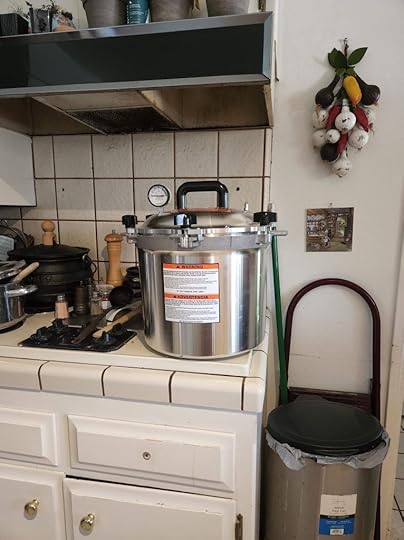 MY BABY CAME HOME AT LAST
MY BABY CAME HOME AT LASTSo, that’s about it from me. I’ve had a decent start to the year, and am looking forward to the next quarter. What about you guys? How’s 2022 treating you, and what do you have to look forward to?
February 14, 2022
The Music Room: Murder Ballads
Love. L’amour. Is there anything sweeter than a deep intimacy between two people and the legacy it leaves behind?
Unless, of course, it goes south and one of them mysteriously disappears and the other one has blood on their hands. Sometimes that legacy evolves into one of my favourite genres of music, the precursor to today’s true crime podcasts- the murder ballad.
‘That sounds extra as fuck, Avon,’ you say, eyes wide in alarm and just a touch of morbid intrigue. ‘What is a murder ballad?’
Well, a ballad, in its essence, is a song that tells a story; sometimes of a specific event, sometimes just in a broad sense. A murder ballad, therefore, tells the story of someone’s gruesome death, and often the events leading up to it and the aftermath.
Sometimes, they’re even true.
I can almost guarantee that you’ve heard one, whether you recognised it as such or not. Have you ever been going along with a catchy tune and all of a sudden picked up on a strange word? So you look up the lyrics and a chill runs down your spine? You hadn’t realised that that peppy little ditty was about…that.
 Looking at you, ‘Pumped Up Kicks’
Looking at you, ‘Pumped Up Kicks’Some famous examples include ‘The Night the Lights Went Out in Georgia’, ‘Mack the Knife’, and ‘In the Pines’(sidenote: I did not know Lead Belly recorded a version, which is very cool, so this is his), among many, many others. Because murder ballads have a very long and understandably controversial history.
From what we can tell, they seem to have originated in Northern European musical tradition, mostly in England/northeast Ireland/southern Scotland and Scandinavia. The absence of them in Welsh oral tradition implies a more Germanic origin than Celtic, which frankly surprises me. These early songs tend to be morality pieces, with the victim being avenged and the murderer being brought to justice, usually by burning a woman and/or hanging a man.
Many of the originals were published in early forms of newspapers called broadsides, with street musicians singing out the stories. They read like sensation fiction, with prophetic dreams, ghostly apparitions, curses, and sometimes the literal devil makes an appearance. They were so popular that when Europeans came to the New World, the tradition spread and old English songs were given new settings and characters to reflect the flavour of Appalachia or the West, as the singer needed. Unfortunately, the ones about local crimes that had very narrow scope and short interest, have been lost, or will be lost when those who remember them pass.
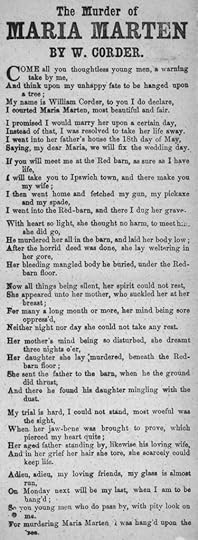 A very famous early one is the Murder of Maria Marten, or the Red Barn Murder (btw, W. Corder was her murderer, not the songwriter)
A very famous early one is the Murder of Maria Marten, or the Red Barn Murder (btw, W. Corder was her murderer, not the songwriter)So what makes a murder ballad?
Well, numbers one and two: gotta tell a story about someone dying at the hands of someone else. Who that first someone is changes over time and locale. Traditionally, it’s a woman (‘Eye-friggin’-roll,’ – Bailey Sarian, 2021), and one who has done a naughty, by society’s or God’s law. She was unfaithful, improper, ambitious, greedy, etc etc. She’s usually killed by a lover, ex-lover or family member. The implication is usually that, I mean, well, what did she expect? Sometimes it’s a man, and if he’s killed by another man, it’s often an honour killing like a duel, or a kill-or-be-killed situation, or revenge. If he’s killed by a woman, it’s usually self-defense or revenge for infidelity.
However, you still can’t go around murdering people, even impious women or another cowboy who’s too slow to draw. So traditionally, the murderer also faces some punishment. One sin does not justify another, you both fry.
They’re not happy songs, I don’t know what to tell you. But they’re fascinating. And often way too infectious. That’s the part that gets me. Now I have ‘Mack the Knife’ stuck in my head.
One thing, to be clear, this has to be intentional homicide by one living human being against another formerly living human being. Accidents, illness, suicide, bear attack, zombie scratch, grievous bodily injury- all bummers, but do not a murder ballad make.
Now, over time, things have shifted a bit. The traditional tropes of murder ballads have expanded to include spree killers, serial killers (not the same thing, btw), school shooters (ok, that is a spree killer, but a specific kind), and an often overlooked whole genre (because *coughracismcough*) gangster rap. I read a fascinating article that really opened my eyes to a lot of things, and if you love the macabre and socially illuminating like I do, you should definitely check it out. I don’t want to get too far into it because this post wasn’t meant to be a deep dive, but it did make me question some assumptions I had, and uhh, yeah, I was being racist about it, lol. Lesson learned.
 Yeah, not a poet and a musician. Just a gangster.
Yeah, not a poet and a musician. Just a gangster. So, there you have it, some cute music to listen to with your sweetie while you celebrate this romantic holiday. Please don’t kill each other.
By the way, if you want a real wild earmworm, check out this bardcore cover of ‘Pumped Up Kicks,’ by Hildegard von Blingin’ and Cornelius Link. It’s the perfect intersection of two of my favourite things: deep, deep nerdiness about Medieval history and murder ballads.
If you or someone you know is suffering from domestic abuse, please contact The Domestic Abuse Hotline
~~~~
What’s your favourite murder ballad? Come on, I know you have one.
January 17, 2022
The Reading Nook: 2022 List
Let’s try something new, shall we? I have a tonne of books, I’m sure you can relate, and I need to organise them so that I can inch through them. So maybe it’ll help to make a list here, that I can access, and so that you guys can see what I’m working on.
Books that I have finished that I need to review:
A Chorus RisesBrambles in the Wishing WellThe Mark of ZorroA Thousand Dreadful CursesCaravalLegendaryI Am Half-Sick of ShadowsBooks in progress:
FinaleBooks to Read Next:
The Wild GirlVasilisa the WiseThe Beast’s GardenWitches of EileannBirds of RhiannonThe Last True Poets of the SeaThe Hero with a Thousand FacesThe FiveRamonaThe Uses of Enchantment The Chronicles of PrydainThe Chronicles of NarniaOnce Upon a Broken HeartThrone of the Crescent MoonThis is obviously very, very bare-bones and not attributed correctly, but I promise when I post the reviews, they will be properly credited. This is just to keep me honest and chugging along.
January 1, 2022
One Word: Whole
This past year has been…
Ok, let me start over.
This last couple of years have been a mess. I’ve been up and down- mostly down, if I’m honest. I’ve let a lot of things slide, and a lot of things have run right over the top of me. I struggle to remember specific things that have happened, and when, and in what order. The months bled together and eventually the years. It’s a blur of lying in bed watching tv, hunched in my writing chair bullying myself into writing, or pacing the aisles of the same four grocery stores once a week as my only escape from my house.
Back in 2017, my friend Jacob started a trend of choosing one word as the theme of the year, rather than a list of resolutions. My One Word for 2018 was ‘Focus’ because I wanted to get my ducks in a row to publish. In 2019, it was ‘Growth’ because I wanted to grow my scope and my audience. In 2020, before everything went to shit, it was ‘Streamline’ because the previous years had been a messy jumble of chasing cars and licking wounds. I thought advanced planning would be the hack, and when everything went bad and I had no choice but to stay home and work, I thought I’d be right. In 2021, I chose ‘Regroup’ because most of my life I thought what I needed to do when I went off the rails was take a deep breath, get my feet under me, and buckle down.
Focus, concentrate, get your shit together.
Have you noticed a pattern? I think I do.
That doesn’t work. You’d think it would, it sounds like it would. But the problem is that my brain wants to focus, it wants to work. When I get thrown off, it’s not because I forgot to focus and needed to be reminded. It’s because I’m only focusing on one thing, and there’s more to life than focusing on writing, and more influences on my writing than my ability to focus.
A friend of mine made a joke recently about assigning me homework to ‘find the joy in life again.’ I laughed it off, but the idea festered.
I put so much pressure on my ability to write. If I stay in bed too long, it gets hard to write. If I don’t write, I get depressed and I stay in bed. And the cycle spirals downward until the deadlines just whoosh past me.
A couple weeks ago, I started an exercise regimen. I don’t like to exercise. I was built to sit and create. But the body wants to go on living, so it must be indulged like a toddler. One weekend, I overdid it and didn’t want to exercise, but I was already feeling down and knew that if I didn’t exercise, I’d have guilt on top of fatigue and disappointment.
The same friend Jacob started going back to the gym in his own journey of self care and in one gym selfie, he adapted an old wtiting adage- I don’t enjoy exercising, I enjoy having exercised. He is such a wise friend, I value him immensely.
So I got up and worked out. It was clumsy and unsatisfying, but the absence of guilt was palpable. I was sore and annoyed, but not disappointed in myself.
And that’s when it hit me.
Writing is only part of the picture. It’s a big part of the picture, both in terms of time investment and emotional investment, but it’s not the whole picture, isn’t the only thing contributing to my mental health.
So this year, my One Word is ‘Whole’. I’ll still be focusing on writing, but I’ll be giving myself some space to attend to other aspects of my life, as well. Exercise, meditation, my hair and skin journeys, housework, hobbies, reading, and writing.
The thing is, 2021 was pretty much 2020: The Sequel, and even with vaccinations and a low death rate, Covid is not over. Life, for me at least, is not going to return to normal any time soon. I need to do something, I need to adjust. And I’m not built to mope.
There may be some growing pains, some missed deadlines, some wordcount goals falling short, but the trade-off might be overall improved mental, emotional, and physical health. Which in turn might produce better stamina and focus.
I also anticipate falling off the proverbial wagon more than once, with all these balls to juggle. But I can’t imagine a downside to at least trying.
What about you? What One Word would you choose to carry with you through 2022?



